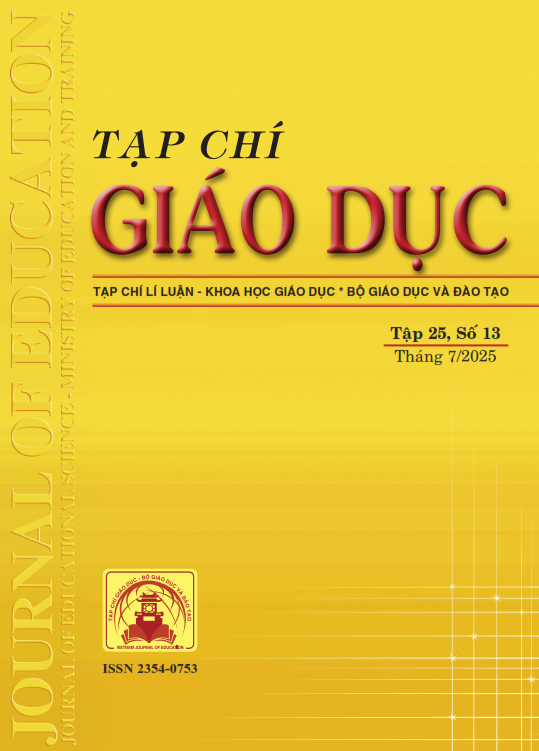Mô hình đại học thông minh: Thực tiễn từ Úc và kinh nghiệm cho Việt Nam
Tóm tắt
Australia is one of the leading countries in developing smart university models. They focus on developing smart systems, online learning systems, along with integrating AI into learning processes, to improve the quality of education and enhance interaction between stakeholders. This paper uses literature review and case study methods to analyze and evaluate the smart university model from Australian practice. Finally, the article draws lessons for Vietnam, including: Investing in technology for higher education institutions; Developing leadership, management, and governance of smart university models; Building smart economic models in higher education; Developing smart social models in schools; Building policies to support the development of smart university environments and models. The experience gained from this study can contribute to improving the quality and development of Vietnamese higher education in the current context.
Tài liệu tham khảo
Ghonoodi, A., & Salimi, L. (2011). The study of elements of curriculum in smart schools. Procedia - Social and Behavioral Sciences, 28, 68-71. https://doi.org/10.1016/j.sbspro.2011.11.014
Fassi, D., Landoni, P., Piredda, F., & Salvadeo, P. (2020). Universities as Drivers of Social Innovation: Theoretical Overview and Lessons from the “campUS” Research. Springer International Publishing.
Canada, G., Evelyn, C., & Schmidt, E. (2014). New York smart schools Commission Report. https://www.ny.gov/ sites/default/files/atoms/files/SmartSchoolsReport.pdf
Henebery, B. (2023). Educator Insights: What’s in store for Australian education in 2024? The Educator K/12. https://www.theeducatoronline.com
Hồ Văn Thống, Nguyễn Văn Đệ (2022). Nghiên cứu xây dựng mô hình thực hiện nội dung giáo dục địa phương đáp ứng Chương trình Giáo dục phổ thông 2018. Tạp chí Khoa học Giáo dục Việt Nam, 18(4), 12-17.
Ibrahim, M. S., Razak, A. Z. A., & Kenayathulla, H. B. (2013). Smart principals and smart schools. Procedia - Social and Behavioral Sciences, 103, 826-836. https://doi.org/10.1016/j.sbspro.2013.10.404
Niemi, H., Kynäslahti, H., & Vahtivuori-Hänninen, S. (2012). Towards ICT in everyday life in Finnish schools: seeking conditions for good practices. Learning, Media and Technology, 38(1), 57-71.
Nguyễn Đức Ca (chủ biên, 2020). Quản lí chất lượng đào tạo ngành Hàng hải Việt Nam theo ISO. NXB Giao thông Vận tải.
Nguyễn Hồng Thuận, Lê Thị Quỳnh Nga (2017). Mô hình tư vấn học đường trong nhà trường trung học. NXB Đại học Quốc gia Hà Nội.
Nguyễn Hữu Đức, Hà Quang Thụy, Phạm Bảo Sơn, Phan Xuân Hiếu, Trần Trọng Hiếu, Trần Mai Vũ, Nguyễn Trí Thành (2020). Đại học thông minh: Bối cảnh thế giới và liên hệ với Việt Nam. Trường Đại học Công nghệ - Đại học Quốc gia Hà Nội. https://uet.vnu.edu.vn/dai-hoc-thong-minh-boi-canh-gioi-va-lien-voi-viet-nam
OECD (2023). Education at a Glance 2023: OECD Indicators. OECD Publishing.
Polin, K., Yigitcanlar, T., Limb, M., & Washington, T. (2023). The making of smart campus: A review and conceptual framework. Buildings, 13(4), 891. https://doi.org/10.3390/buildings13040891
Sarcevic, A. (2020). Curtin and Optus partner to deliver 5G smart campus. Technology Decisions. https://www.technologydecisions.com.au/content/it-management/news/curtin-and-optus-partner-to-deliver-5g-smart-campus-27901673
University of Sydney (2024). Smart Sustainable Building Network. https://www.sydney.edu.au/nano/our-research/ networks/smart-sustainable-network.html
Vũ Thị Thúy Hằng (2018). Trường học thông minh: Nguồn gốc, định nghĩa và bài học kinh nghiệm cho Việt Nam. Tạp chí Giáo dục, 432, 6-10.
Tải xuống
Đã Xuất bản
Cách trích dẫn
Số
Chuyên mục
Giấy phép

Tác phẩm này được cấp phép theo Ghi nhận tác giả của Creative Commons Giấy phép quốc tế 4.0 .












